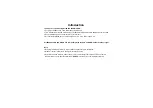
•
Location: Choose the appropriate location for this Cisco Unified IP Phone.
•
Owner User ID: From the drop-down list, choose the user ID of the assigned phone user.
b) In the Protocol Specific Information pane of this window, choose a Device Security Profile from the
drop-down list. To enable security features for a phone, you must configure a new security profile for the
device type and protocol and apply it to the phone. If the phone does not support security, choose a
nonsecure profile.
To identify the settings that are contained in the profile, choose
System
>
Security Profile
>
Phone
Security Profile
.
The security profile chosen should be based on the overall security strategy of the company.
Note
c) In the Extension Information pane of this window, check the Enable Extension Mobility box if this phone
supports Cisco Extension Mobility.
d) Click
Save
.
Step 2
Configure line settings:
a) On the Phone Configuration window, click
Line 1
on the left pane of the window. The
Directory Number
Configuration
window appears.
b) In the Directory Number field, enter a valid number that can be dialed.
This field should contain the same number that appears in the Telephone Number field on the
User Configuration
window.
Note
Example:
26640 is the directory number of user John Doe in the example above.
c) From the Route Partition drop-down list, choose the partition to which the directory number belongs. If
you do not want to restrict access to the directory number, choose
None
for the partition.
d) From the Calling Search Space drop-down list (Directory Number Settings pane of the Directory Number
Configuration window), choose the appropriate calling search space. A calling search space comprises a
collection of partitions that are searched for numbers that are called from this directory number. The value
that you choose applies to all devices that are using this directory number.
e) In the Call Pickup and Call Forward Settings pane of the Directory Number Configuration window, choose
the items (for example, Forward All, Forward Busy Internal) and corresponding destinations to which
calls should be sent.
Example:
If you want incoming internal and external calls that receive a busy signal to be forwarded to
the voice mail for this line, check the Voice Mail box next to the
Forward Busy Internal
and
Forward
Busy External
items in the left column of the Call Pickup and Call Forward Settings pane.
f) In the
Line 1 on Device...
pane of the
Directory Number Configuration
window, configure the following:
•
Display (Internal Caller ID field): You can enter the first name and last name of the user of this
device so that this name will be displayed for all internal calls. You can also leave this field blank
to have the system display the phone extension.
•
External Phone Number Mask: Indicate phone number (or mask) that is used to send Caller ID
information when a call is placed from this line.
You can enter a maximum of 24 number and
X
characters. The Xs represent the directory number and
must appear at the end of the pattern.
Example:
Using the John Doe extension in the example above, if you specify a mask of 408902XXXX,
an external call from extension 6640 displays a caller ID number of 4089026640.
Cisco Unified SIP Phone 3905 Administration Guide for Cisco Unified Communications Manager 8.6 (SIP)
109
Basic Phone Administration Steps
Set Up Phone Fields














































